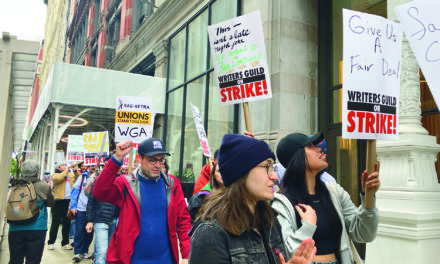“We need a collective voice to fight for what we deserve. No one should have to beg for fair compensation and better working conditions while working for one of the most profitable organic grocers in the world … Despite generating 93.8 billion dollars in gross profits in 2023, Whole Foods Market refuses to pay their workers a living wage. As Jason Buechel, Jeff Bezos and other major Amazon shareholders’ pockets grow deeper, team members struggle to afford rent, healthcare, childcare, and other basic necessities,” reads a statement from workers at the Philadelphia Whole Foods who recently filed a representation petition with the National Labor Relations Board.
Whole Foods, owned by tech giant Amazon since 2017, has long prided itself on an image of employee satisfaction and progressive corporate culture. However, its employees are challenging their narrative, citing stagnant wages, insufficient staffing, and eroding benefits. Employees say that they are increasingly feeling the pressure of heightened workloads as the company implements cost-cutting measures.
In a recent development covered by the Houston Chronicle, workers in a Whole Foods location in Texas have openly called for union representation. Their efforts align with a wave of labor organizing within other Amazon-owned operations, including warehouses where workers have fought for improved wages and working conditions in high-pressure environments.
Meanwhile, workers at the Whole Foods store in Philadelphia filed to hold the first union election at the chain since Amazon acquired it in 2017. The employees, supported by UFCW Local 1776, cite low wages, high workloads, and intense productivity demands as reasons for their efforts.
“This company makes billions, yet we can barely make a living,” said Ben Lovett, a store employee. He noted that many colleagues juggle multiple jobs and cannot afford groceries at their workplace. The union drive builds on earlier organizing efforts during the pandemic when safety concerns first united workers.
Another employee described feeling overworked and underappreciated. “During Covid, we were essential workers. Now it feels like we’re just grocery store employees again,” said the employee. Ed Dupree, an eight-year veteran in the produce department, highlighted worsening conditions, with coworkers increasingly struggling to keep up.
UFCW Local 1776 President Wendell Young IV commended the workers’ courage and criticized Amazon’s union-busting tactics, adding, “This is about workers standing up for their rights.”
Whole Foods workers argue that their current conditions are untenable. Employees report difficulties balancing their personal lives due to unpredictable scheduling and the physical demands of the job.
“The image that Whole Foods sells to the public doesn’t match what it’s like to work here,” said one worker involved in the union effort. This disconnect has fueled organizing efforts as workers demand a greater voice in decision-making processes that affect their livelihoods.
The company has responded with familiar union-avoidance tactics. Whole Foods management has reportedly held mandatory meetings to discourage employees from unionizing, employing anti-union rhetoric aimed at dissuading workers from pursuing collective bargaining.
This struggle highlights a larger trend: workers in the retail and grocery sectors are becoming increasingly organized and determined to address longstanding issues. Across the country, union drives at companies like Starbucks, Trader Joe’s, and REI have demonstrated that workers are ready to challenge corporate power to secure fair wages, reliable schedules, and safer workplaces.





